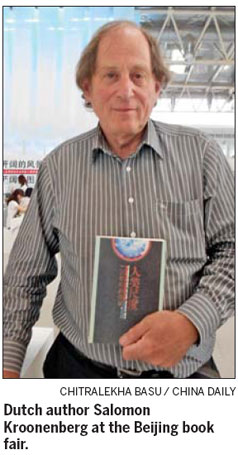Climate relativist challenges the new orthodoxy
Updated: 2011-09-09 07:49
By Chitralekha Basu (China Daily)
|
|||||||||
The gigantic egg-shaped auditorium of the National Center for the Performing Arts in Beijing reminded Salomon Kroonenberg of the Finnish folk epic Kalevala, about the genesis of the Earth. Just as watching sulfur spewing out of the ground in coal mining districts in Northwest China almost 16 years ago, reminded him of etchings illustrating Dante's vision of hell in the classic 14th-century Italian epic Divina Commedia.
"Dante was the first writer to imagine hell in 24 layers," says Kroonenberg, the only geologist and book-fair virgin in a team of 25-odd Dutch writers at Beijing International Book Fair 2011.
"Similarly, my book Why Hell Stinks of Sulfur (2011) is laid out in 24 chapters, each corresponding to Dante's theme in the original. For instance, one of the circles in Dante's hell is about greed. In my book, the chapter headlined Greed is about digging the earth for gold."

Even as he maps the interiors of Earth with his scientist's tools, Kroonenberg tries to make sense of his findings in terms of the classics of literature, from Homer to sci-fi writers such as Jules Verne.
"People have told me they find deep religious-philosophical resonances in my writing," he says. "But I'm an atheist. I only wish to establish a nature reserve under the Earth's surface, rich in natural resources, where my grandchildren will walk in shoes with toes curling upwards, so as to not hurt the Earth."
A professor of geology at Delft University of Technology, Netherlands, until 2009, Kroonenberg retired early to devote more time to research and writing. A long-time columnist with the Dutch weekly Intermediair, he came under the spotlight after Al Gore's Oscar-winning documentary, An Inconvenient Truth (2006), spun a worldwide campaign about the dangers of global warming.
Kroonenberg's first book, The Human Dimension: the Earth in Ten Thousand Years from Now (2006), even as it is essentially about geological concerns such as tectonic shifts and volcanic eruptions, contains observations about climate that seem directly in opposition to the idea that reducing carbon emissions might help curb global warming and save the world from drowning under the sea.
Kroonenberg argues that climate change has been happening since antiquity and humans are known to have survived "two ice ages, with bear skins and ice axes".
In 2008, Kroonenberg published an enlarged, revised edition of his book, which has since been translated in several languages, including a recent Chinese edition (Shanghai Literature and Art Publishing House). In it he challenges Gore's "alarmist rhetoric".
"We're smart enough to evolve flexible solutions" to deal with a devastating deluge should the glaciers melt and inundate the earth, Kroonenberg suggests.
But more importantly, he insists that reducing carbon footprints would not necessarily make a difference to the future of the world.
Urging his audience to see things in terms of geological time, (10,000 years at a stretch), the geologist contends that we are, in fact, living at the peak of summer between ice ages, and, if the cyclical rhythm of climate change is anything to go by, we should be preparing for a "little ice age" like the one experienced between 1350 and 1800.
Often labeled a "climate skeptic" by the anti-CO2-emissions lobby, and criticized for his indifference to the Kyoto Protocol of 1997, in which parliaments of 55 countries decided to cut down on greenhouse emissions, Kroonenberg prefers to call himself a climate relativist. He doesn't consider CO2 emissions "an insurmountable problem" in the context of nature changing and adjusting itself as a continuous process.
"I don't deny climate has been warming and I also do not deny that humankind has emitted large quantities of CO2. I only challenge the importance of that for climate change.
"To assume we human beings have a golden key to keep the world at zero position, is arrogance," he adds.
China Daily
(China Daily 09/09/2011 page19)